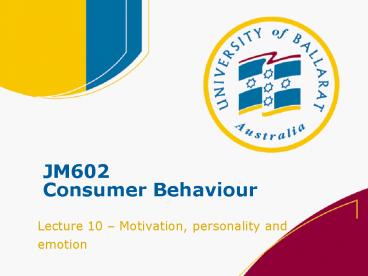JM602 Consumer Behaviour PowerPoint PPT Presentation
1 / 28
Title: JM602 Consumer Behaviour
1
JM602Consumer Behaviour
- Lecture 10 Motivation, personality and emotion
2
(No Transcript)
3
Material in these slides
- Primarily drawn from
- Neal, Quester and Hawkins (2005). Consumer
behaviour Implications for marketing strategy
(4th ed). McGraw-Hill Irwin Queensland
4
Motivation, Personality and Emotion
- What is motivation?
- What theories help us understand motivation?
- How do marketers can appeal to consumers
motives? - What are the underlying aspects of the theories
of personality? - How is personality related to marketing?
- How can emotions can be used in marketing
strategies?
5
What is the nature of motivation?
- Consumer motivations are the energising forces
that activate behaviour and provide purpose for
and direction to that behaviour - Seem highly dependent on the situation at hand
- Neal et al (2005) p. 322
6
Theories of Motivation
- Maslows hierarchy of needs
- McGuires psychological motives
7
Maslows Hierarchy of Needs
- All humans acquire a similar set of motives
through genetic endowment and social interaction - Some motives are more basic or critical than
others - The more basic motives must be satisfied to a
minimum level before other motives are activated - As the basic motives become satisfied, the more
advanced motives come into play.
8
Maslows Hierarchy of Needs
Self-Actualisation (Self-fulfillment)
Social Needs (affection, friendship,
belonging)
Ego Needs (Prestige, status, self esteem)
Safety and Security Needs (Protection,
order, stability)
Physiological Needs (Food, water, air,
shelter, sex)
9
McGuires Psychological Motives
- Cognitive preservation motives
- Cognitive growth motives
- Affective growth motives
- Affective preservation motives
10
McGuires Psychological Motives Cognitive Motives
11
McGuires Psychological Motives Affective Motives
12
Appealing to the individuals need for
self-Expression
13
Appealing to Consumers Need to Enhance their
Self-Esteem
14
Discovering Purchase Motives
Latent motives
Manifest motives
15
Latent and Manifest Motives in a Purchase
Situation
16
Motivation Research Techniques
- Association techniques
- word association
- successive word association
- Completion techniques
- sentence completion
- story completion
- Construction techniques
- cartoon techniques
- third-person techniques
- picture techniques
17
Marketing Strategies Based on Motivation Conflict
- Approachapproach
- Approachavoidance
- Avoidanceavoidance
18
Personality
- Individual personality theories
- Social learning theories
- A combined approach
19
Personality (cont.)
- Nature of personality
- Individual personality theories
- Sigmund Freud
- Neo-Freudians
- Trait theory
20
The Five-Factor Model of Personality
21
The Use of Personality in Marketing
- Brand personality
- A set of human characteristics that become
associated with a brand
22
Dimensions of Brand Personality
23
Communicating Brand Personality through
Advertising
24
Communicating Brand Personality through
Advertising (cont.)
25
The Nature of Emotions
26
Types of Emotions
27
Emotions and Marketing Strategy
- Emotion arousal as a product benefit
- Emotion reduction as a product benefit
28
Next Lecture
- Attitude and Attitude Change

